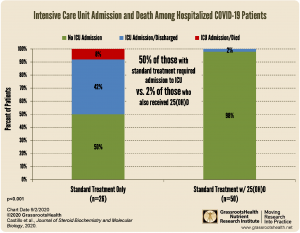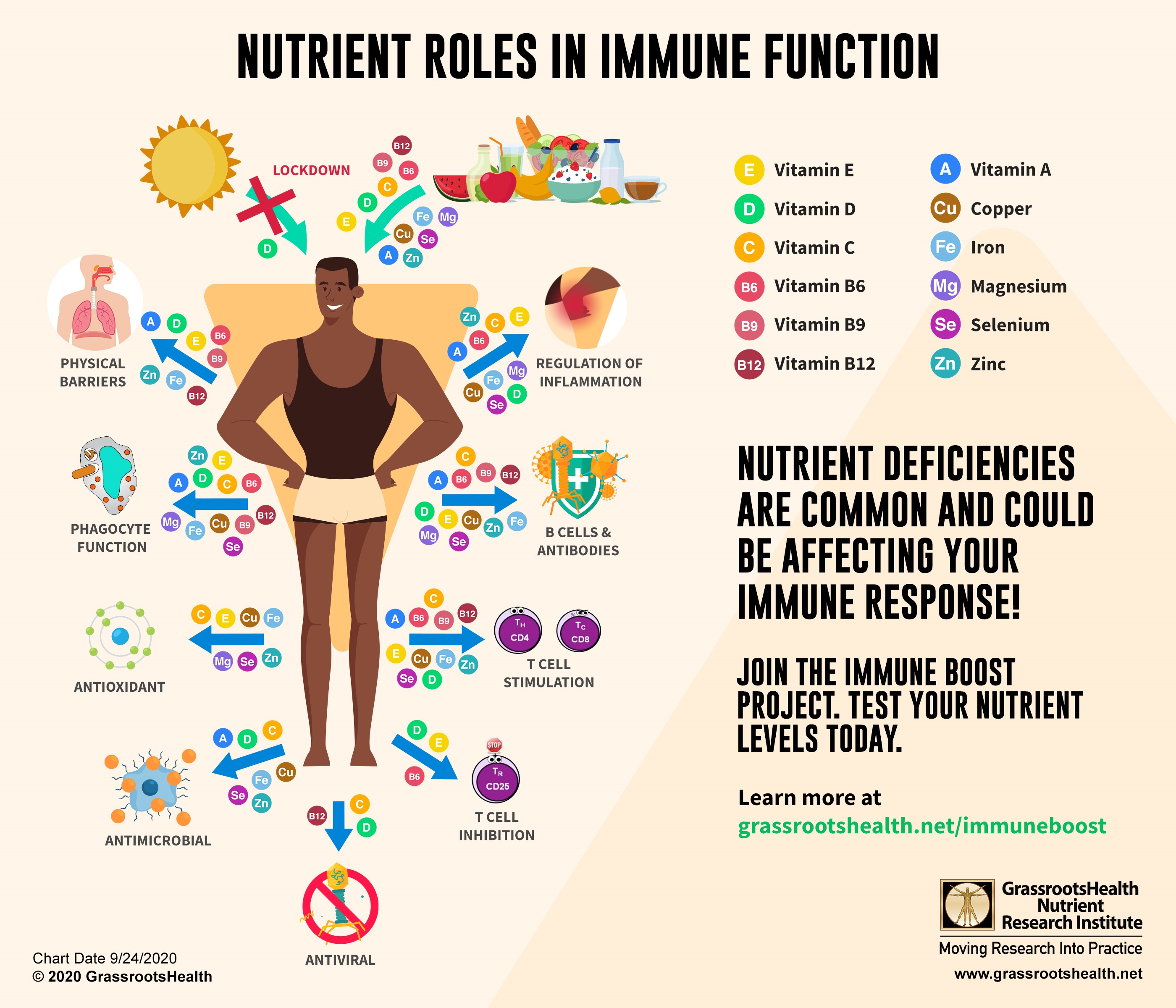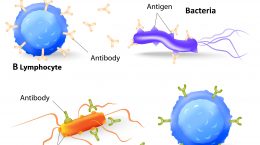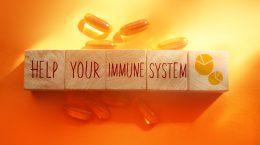Published on September 25, 2020
What are some of the specific roles nutrients play in immune function?
The immune system is essential for health and well-being, something we are keenly aware of in the current pandemic. Over the past several months GrassrootsHealth has been sharing information about how your immune system works, (including the roles of phagocytes, B cells and antibodies and T cells). We have discussed how micronutrient deficiencies impair immune function, yet it is all too common for many of us to have one or several nutrients that we do not get enough of. Ensuring adequate nutrient intake is important for a well-functioning immune system and an easy way to boost your protection.
Today we will discuss the roles that vitamins and minerals play in optimizing immune function and reducing inflammation.
Nutrient Roles in Immune Function
Click to Download, Share & Print!
Vitamin A
Vitamin A is important for physical barriers of defense. It helps maintain the integrity of the skin, eye, respiratory, gastrointestinal, and genitourinary tracts to keep pathogens from gaining access to the body. Vitamin A is needed for the proper function of T cells, B cells and antibody production and also has antioxidant effects to help protect immune cells.
Vitamin B6
Vitamin B6 acts in conjunction with folate and B12 and is important in the formation of new cells. Vitamin B6 is required for antibody production and has roles in lymphocyte proliferation and differentiation.
Folate and Vitamin B12
Folate is a B-vitamin required for DNA synthesis, and in combination with vitamin B12, is important for new cells to be formed. Because immune cells have high metabolic activity and high rates of proliferation, they require folate and vitamin B12 to form new immune cells and mount a proper immune response. Folate is important for antibody production and supporting Th1 responses. Vitamin B12 acts to modulate the effect of cytotoxic cells (NK and CD8+ T cells) and supports T cell production.
Vitamin C
Immune cells produce reactive oxygen species (ROS) to kill pathogens. Vitamin C is an antioxidant that plays an integral role in protecting immune cells and other nearby cells of the body from damage that may be caused by those ROS. Vitamin C increases phagocytic activity and has roles in T and B cell differentiation and proliferation and in antibody production.
Vitamin D
Vitamin D has numerous effects on cells within both the innate and adaptive immune systems. Vitamin D is needed for the production antibacterial proteins (cathelicidin and defensins) and plays a role in phagocyte function (including monocytes, macrophages and dendritic cells). Vitamin D has numerous effects on B and T cells and the complex interplay between them. For example, vitamin D stimulates a shift in T cell subtypes (from Th1 to Th2) which influences whether the response is inflammatory or anti-inflammatory. Vitamin D has many inhibitory effects on an overactive adaptive immune response (such as in allergy or autoimmune disorders), including inhibition of T cell proliferation, suppressed antibody production, generation of more tolerant dendritic cells, and inhibits pro-inflammatory cytokine production.
Vitamin D has many functions within the immune system which supports its direct involvement in the immune response to the SARS-CoV-2 virus and combating COVID-19. Many observational studies have been published showing a strong relationship between vitamin D level and COVID-19 disease severity and outcome, including the Radujkovic study showing a 15 fold higher risk of death for those with vitamin D levels below 12 ng/ml (30 nmol/L) versus 12 ng/ml or higher. Also, the first published randomized controlled trial on vitamin D and COVID-19 showed that vitamin D given to COVID-19 patients upon admission to the hospital [as 25(OH)D], resulted in a reduced need for intensive care, from 50% in the control group to only 2% in the vitamin D group, and the elimination of deaths.
Vitamin E
Vitamin E, like vitamin C, is an antioxidant that is important for protecting the cell membranes of immune cells. Vitamin E enhances T cell function and reduces the production of signals that would dampen the immune response.
Copper
Copper is a structural and functional component of superoxide dismutase, an important antioxidant enzyme that protects immune cells from oxidative damage. Copper also has roles in T cell proliferation, antibody production, and may also help cells of the innate immune response kill bacteria.
Iron
Iron is a structural and functional component of several metabolic and antioxidant enzymes that are critical for normal immune function. Iron is necessary for many immune functions, including the differentiation and proliferation of T cells and the generation of ROS that kill pathogens. Both iron deficiency and iron overload (too much stored iron in the body) are associated with impaired immune function and increased susceptibility to infection. Iron overload also negatively affects immune cell function and can make individuals especially vulnerable to pathogens.
Magnesium
Magnesium is a cofactor in hundreds of enzymes including those involved in DNA metabolism, replication and repair, and protection of DNA from oxidative damage. Magnesium is needed for antigen binding to macrophages and activation of B and T cells. Magnesium is also an important cofactor for antibody production.
Selenium
Selenium is an integral component of glutathione peroxidase and thioredoxin reductase, two antioxidant enzymes that protect immune cells from oxidative damage. Selenium is involved in T cell proliferation and antibody production. Selenium also influences the production of cytokines and eicosanoids — chemical messengers that regulate inflammation and immune cell function.
Zinc
With high rates of new cells being produced, zinc is required for the growth and development of immune cells involved in both innate and acquired immunity. Zinc plays an important role in T cell activation and response (it is needed for T cell receptor binding) and the production of antibodies. Zinc is also a structural and functional component of enzymes critical for normal immune function. Superoxide dismutase, dependent on zinc as well as copper, is important for protecting immune cells from ROS they generate to kill invading pathogens.
Could Nutrients Help Improve Your Immune Response?
Could getting more of certain nutrients help to decrease your levels of inflammation and improve your immune response? Find out by testing your vitamin D, omega-3s, magnesium and other essential elements (including copper and zinc), as well as your inflammation levels, with the new Immune Boost home test kit offered by GrassrootsHealth. Measuring levels is the only way to know if you are supporting your immune system and whether additional changes should be made, with supplementation, dietary changes, or both.
Enroll now with the Full Immune Boost Panel (which includes tests for vitamin D, Omega-3 Index, magnesium, zinc, selenium, copper, and hsCRP), and get 10% off when you use coupon code BoostTen at checkout.
What Does it Take YOU to Get Your D to 40 ng/ml (100 nmol/L)?
Did you know your health could be greatly affected by making sure you have a vitamin D level of at least 40 ng/ml (100 nmol/L)? Help us help you.
STEP 1 – Do you know what your vitamin D level is? If not, be sure to test today to find out.
STEP 2 – Determine your target level. Are you at your target level? Experts recommend a level of at least 40-60 ng/ml (100-150 nmol/L).
STEP 3 – Need to boost your level? Use the D*calculator to see how much vitamin D it may take to reach your target. Opt for the Loading Dose for a quicker boost.
STEP 4 – Optimize how your body absorbs and utilizes vitamin D with co-nutrients and these simple steps.
STEP 5 – Re-Test! This is an important step to make sure you have reached your target level, and to ensure you are not taking too much! Re-testing after 3-4 months is recommended.
STEP 6 – Adjust, Repeat…
Give your immune system the nutrients it needs to support a healthy you and protect yourself from unnecessary diseases, especially COVID-19.
NEWS ALERT
 The first Randomized Controlled Trial on vitamin D and COVID-19 has shown a 96% lower risk of ICU admission for those receiving vitamin D (as 25(OH)D to quickly boost vitamin D blood levels) along with the standard treatment, compared to those receiving standard treatment alone.
The first Randomized Controlled Trial on vitamin D and COVID-19 has shown a 96% lower risk of ICU admission for those receiving vitamin D (as 25(OH)D to quickly boost vitamin D blood levels) along with the standard treatment, compared to those receiving standard treatment alone.
These results support many previous observational studies showing a relationship between vitamin D levels and intake and COVID-19 severity.
Review the Latest Nutrient Research for COVID-19
GrassrootsHealth Nutrient Research Institute has launched the new Immune Boost project with the use of our myData-myAnswers nutrient health system that nearly 15,000 people are already using for their health. Specific markers that influence immune health are suggested for testing as part of this project including:
- Vitamin D
- Omega-3 Index
- Essential elements magnesium, selenium, and zinc
- hsCRP
Our goal is to demonstrate how one can use the Nutrient Research Model established by Dr. Robert Heaney to show the effect of vitamin D serum levels of at least 40 ng/ml (100 nmol/L) on risk reduction for all ethnicities in the population. Status and intake of other nutrients will also be analyzed for any type of relationship to immune status and symptom severity. Join the project today!
How can I track my nutrient intake and levels over time?
To help you track your supplement use and nutrient levels, GrassrootsHealth has created the Personal Health Nutrient Decision System called
For each specific supplement, you can track what days you take it, how much, and many other details. This will help you know your true supplemental intake and what patterns of use work for you to reach and maintain optimum nutrient levels. Check it out today!









